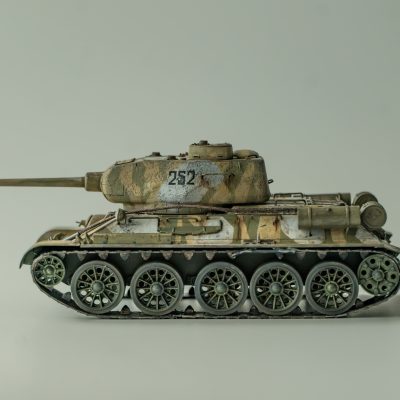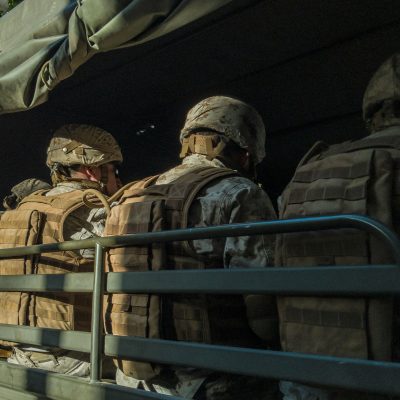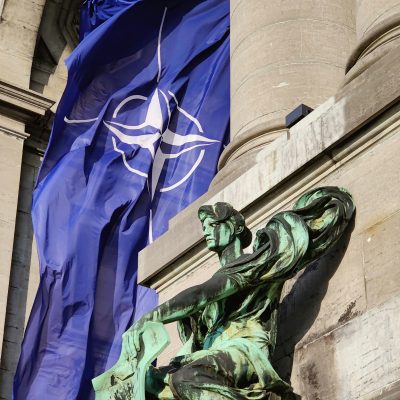Un mois de guerre en Ukraine:
les premières leçons
« la Russie a fait exister l’Ukraine à ses propres yeux
en voulant la faire disparaître de la carte de l’Europe »

← Télécharger le pdf ![]() Télécharger l’epub
Télécharger l’epub
Citer cet article:
Bret C. 2022. «Un mois de guerre en Ukraine: les premières leçons», Blogpost, Paris: Institut Jacques Delors, 28 mars.
Introduction : le sort des armes
Un mois après le début de la guerre en Ukraine, l’heure des bilans définitifs n’est malheureusement pas encore venue. Toutefois, un premier bilan politique provisoire est particulièrement nécessaire car le conflit se trouve à un moment d’incertitude et donc de basculement. En effet, le sort de l’Ukraine, la place de la Russie et la sécurité de l’Europe sont en jeu et les combats n’ont encore rien tranché. L’« opération militaire spéciale » de la Russie déclenchée le 24 février était censée tout à la fois changer le régime de l’Ukraine, consacrer la puissance de la Russie et la faiblesse de l’Union européenne. Or, aujourd’hui, ni les combats de haute intensité, ni les bribes de discussions diplomatiques n’ont scellé le sort des trois principaux protagonistes de cette guerre. On peut même aller plus loin et considérer que les quatre semaines de conflit armé placent chacune des parties prenantes à une croisée des chemins encore indécise.
1– Ukraine : de la souveraineté mutilée à la renaissance nationale ?
Examinée à l’aune des ambitions proclamées par la Russie il y a un mois, la situation de l’État, de la nation et de la souveraineté ukrainienne est particulièrement ambivalente.
D’un côté, l’invasion russe accélère et accentue la crise déclenchée en 2014 par l’annexion de la Crimée par la Fédération de Russie et le soutien russe aux entités séparatistes du Bassin du Don (Donbass) : les « Républiques » autoproclamées de Louhansk et Donetsk. En effet, la Russie a non seulement reconnu unilatéralement ces entités comme indépendantes mais également envahi le territoire ukrainien à hauteur de plus de 10 %. Elle a encerclé, frappé ou conquis les principales agglomérations, détruit des infrastructures militaires et civiles vitales pour le fonctionnement de l’Ukraine, sciemment vidé le pays d’une forte partie de sa population et placé l’État ukrainien sous la menace directe de l’anéantissement. Autrement dit, depuis la reconnaissance de l’indépendance de l’Ukraine, en 1991, et la mutilation de sa souveraineté en 2014, jamais l’Ukraine, comme État et comme nation, n’avait été aussi proche de revenir au néant. C’est bien l’intention qui s’exprime dans les communications de la présidence russe : nier l’existence même d’un État-nation ukrainien.
Et pourtant, malgré les dangers – proprement existentiels – qui menacent l’Ukraine depuis quatre semaines, la nation ukrainienne s’affirme avec une résilience qui force l’admiration. À la tentative de Blitzkrieg initale, elle a opposé une résistance du faible au fort dans une guerre combinant les combats militaires classiques, les opérations de partisans, les cyberattaques et la mobilisation de la société civile. Sur le registre symbolique, la bataille du récit est crânement menée par la présidence ukrainienne : le président Zelensky, russophone d’origine, tient tribune ouverte devant les Parlements occidentaux en ukrainien, affirme sans discontinuer l’identité ukrainienne et sa volonté de s’arrimer à l’Europe occidentale. En résumé, la Russie a fait exister l’Ukraine à ses propres yeux en voulant la faire disparaître de la carte de l’Europe.
Aujourd’hui, l’Ukraine comme nation est bel et bien placée entre l’affirmation de son être et la menace du néant.
2– Russie : de la volonté impériale à la fermeture internationale ?
Le sort des armes laisse aussi le destin de la Russie particulièrement incertain.
Déclenchée après une décennie de modernisation des forces armées, après une opération militaire extérieure menée en Syrie, après une opération d’interposition réalisée dans le Caucase entre Arménie et Azerbaïdjan et après une année de hausse des cours internationaux des hydrocarbures, cette « opération militaire spéciale » était aussi destinée à réaffirmer la puissance de la Russie sur le continent européen face à l’Otan et à l’Union européenne. La présidence Poutine a en effet changé de portage dans son rapport de force avec l’Occident. Plutôt que de laisser planer l’ambiguïté sur son rôle en Ukraine, Moscou a décidé de devenir officiellement belligérante pour prendre elle-même les « garanties » de sécurité qu’elle exige de l’Occident depuis plusieurs années. Son invasion de l’Ukraine a d’ores et déjà traumatisé les populations civiles, affaibli durablement l’économie ukrainienne, laminé les pouvoirs publics ukrainiens et contraint les Occidentaux à refuser de s’engager militairement.
Toutefois, l’affirmation de la puissance russe se trouve d’évidence enrayée par plusieurs oppositions directes et indirectes : l’armée russe se trouve contenue (et non pas mise en échec) par la résistance militaire ukrainienne ; la neutralité forcée, que vise le pouvoir russe, n’a pas été imposée à l’Ukraine par les armes ; la faiblesse supposée de l’Union européenne se trouve démentie par une série de sanctions économiques, diplomatiques, technologiques et individuelles, qui placent la Russie à l’écart de l’Europe. Si la victoire militaire russe est encore possible, son succès diplomatique et politique devient de plus en plus improbable.
En somme, l’affirmation de la puissance russe à court terme peut être annulée par un déclin politique durable sur le continent européen. Entre affirmation de la puissance et accélération de son déclin, la Russie n’est pas encore fixée.
3– UE : entre puissance et impuissance
L’Union européenne se trouve elle aussi à la croisée des chemins après quatre semaines d’une guerre à laquelle elle ne prend pas part directement mais qui la concerne au plus haut point.
D’un côté, l’Union européenne n’a ni su prévenir, ni pu arrêter l’offensive russe. Puissance économique, financière, juridique, culturelle et institutionnelle sans équivalent sur le continent, elle constate jour après jour son impuissance militaire et diplomatique à protéger les civils sur le champ de bataille. Ses sanctions proprement historiques n’ont ni arrêté les colonnes de chars qui ont encerclé les principales agglomérations, ni intercepté les missiles hypersoniques qui ont frappé les forces armées ukrainiennes, ni défendu les civils de Marioupol, Kherson, etc. Face à un conflit militaire, les attributs de la puissance européenne peuvent priver la Russie de victoire totale mais ne peuvent lui infliger une défaite.
Mais, d’un autre côté, la guerre en Ukraine a fait franchir à l’idée européenne plusieurs jalons historiques en l’espace de quelques semaines. D’une part, l’UE a osé faire un usage massif des sanctions non plus seulement dans le but d’infléchir la politique russe mais pour la modifier complètement. Les sanctions européennes actuelles ont en effet entièrement changé de nature et d’objectif : auparavant, elles étaient dosées et circonscrites pour éviter que le rapport de force ne soit trop défavorable aux Européens. Désormais, l’Union veut changer la politique russe sur le plan international et sur le plan domestique. Elle a ensuite accepté de fournir à l’un des belligérants, l’Ukraine, des matériels de défense – c’est pour elle un saut qualitatif essentiel car elle désigne ainsi son alliée et son ennemie. Enfin, l’Union européenne sait désormais que son profil de puissance est incomplet : il lui manque la capacité militaire à défendre elle-même ses valeurs et ses intérêts sur le terrain. La prise de conscience est désormais irréversible.




